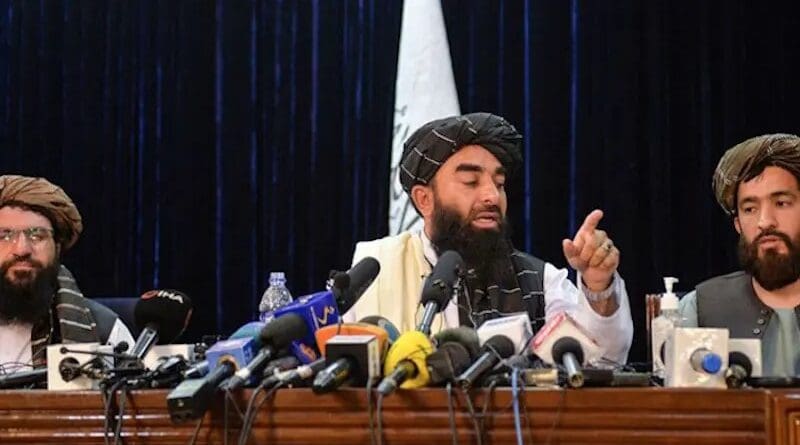Taliban’s Path To International Recognition: Need To Embrace Key Principles – OpEd
In the wake of the Taliban’s swift resurgence in Afghanistan, the world is waiting to see if this time around the Taliban can truly embrace the principles necessary for international recognition as a legitimate governing authority. As international scrutiny intensifies, there’s a growing consensus on the key tenets that the Taliban must adopt to gain the trust of the global community. To establish themselves as a legitimate governing body, the Taliban must unequivocally commit to respecting human rights, ensuring press freedom, promoting women’s education, forming an inclusive government, and adjusting to the international order.
Human rights lie at the core of a just and compassionate society. These rights encompass the fundamental entitlements to life, liberty, and security, as well as the assurance of dignity and equality for all, regardless of their background. However, the Taliban’s historical record in this regard is deeply unsettling, with documented instances of grave human rights violations. International recognition hangs in the balance, contingent on the group’s unwavering dedication to respecting these fundamental human rights. The key litmus test here is their guarantee of the safety and security of all Afghans, particularly those who may have collaborated with foreign entities or expressed dissenting opinions in the past.
An unfettered and independent press is an indispensable element of a functional democracy. It acts as a watchdog, holding those in power accountable and fostering open and honest discourse. In the years leading up to their return to power, Afghanistan enjoyed a flourishing media landscape. Press freedom is not a luxury but a necessity for a well-informed citizenry. The Taliban’s commitment to ensuring press freedom will be a clear indicator of their true intentions. By allowing media outlets to operate without censorship and permitting them to report on events transparently, the Taliban can demonstrate their readiness to accept criticism and scrutiny. Through a free press, the world will observe their actions and policies, which, in turn, will help build trust.
The issue of women’s education is a critical one. Education is a fundamental human right, and depriving women and girls of access to education is detrimental to a nation’s progress. The Taliban’s historical stance on women’s education has been regressive. To gain international recognition, this stance must evolve. Promoting women’s education is not just an ethical imperative but a practical necessity as well. Educated women can make significant contributions to a nation’s development, economy, and social fabric. The Taliban’s commitment to women’s education will signify their ability to adapt to a world that recognizes the indispensable role of women in society.
The establishment of an inclusive government is vital for the stability and unity of any nation. Afghanistan is a culturally and ethnically diverse country, and its government should mirror this diversity. An inclusive government is pivotal for peace and the well-being of all its citizens. The Taliban’s willingness to engage in open dialogue with all segments of Afghan society to form an inclusive government is a clear demonstration of their commitment to a peaceful transition of power. This assures Afghans that they have a say in the nation’s future.
Furthermore, embracing the international order is essential. The global community operates within a framework of norms, principles, and international laws. Adapting to this international order is not a compromise but a recognition of Afghanistan’s place in the world. By doing so, the Taliban can pave the way for diplomatic relations, humanitarian assistance, and economic development. Embracing international norms and principles is a diplomatic necessity that enables Afghanistan to be a responsible member of the international community. The Taliban’s ability to adapt to these norms will play a vital role in determining their recognition.
In conclusion, the Taliban’s journey towards international recognition is laden with challenges. The world is watching, eager to see if they can transcend their past reputation and build a more inclusive, peaceful, and stable Afghanistan. Embracing these imperatives does not mean abandoning their ideology but recognizing the need for change and adaptation. The humanitarian crisis in Afghanistan is dire, and international aid is essential to address the pressing needs of the Afghan people. However, the provision of aid is closely tied to the international community’s assessment of the Taliban’s commitment to these core principles. Afghanistan’s neighboring countries, especially Pakistan, can play a significant role in influencing the Taliban’s decisions. Regional stability, trade, and development depend on a peaceful and stable Afghanistan, making it imperative for neighboring nations to ensure the Taliban’s actions align with these key principles.
The time to act is now, and it lies in the hands of the Taliban to make these vital changes and set Afghanistan on a path to a more hopeful future. Recognition by the international community can unlock essential aid and support, helping the Afghan people rebuild their nation and their lives.

